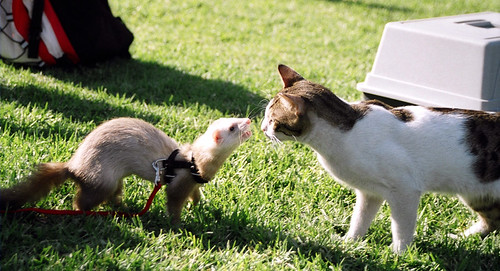
I recently had such a situation and found little information on how to deal with the issue in any ferret book, so I posted the question on my facebook page to see if other people had had similar situations, and, if so, how they had overcome them. Sure enough, the online ferret community came through! Here is some advise that I was given...
FIRST - try to figure out whether the ferret is acting aggressively or simply afraid. If you have just gotten the ferret this is more difficult to determine as you are not yet familiar with his or her body language. Here are some tips to try and determine whether what you are seeing is fear or aggression: FEAR will cause the ferret to back away from the dog or cat and lunge only when the animal comes to near, AGGRESSION will cause the ferret to lunge at the dog or cat without backing away. To make matters more complicated, some ferrets will be fearful of the dog or cat immediately and then begin to act aggressively towards it as it begins to feel more comfortable in the home.
SECOND - keep in mind that if the ferret is aggressive, he or she will likely never be friends with your dog or cat and will likely feel the need to snap at or chase them on occasion; it is possible, however, to get them to co-exist at least part of the time. If the ferret is fearful, it is your duty to teach the ferret that he or she has nothing to fear from the other animals; bear in mind that if you do not teach the ferret that the dog and or cat is not something to be afraid of, you will ruin any chance of a friendly relationship between the animals.
THIRD - use treats, not discipline. Find a treat that your ferret loves and feed it to your ferret when the other animal is around. This technique works best when the other animal receives treats at the same time. Begin at a distance in an area that the ferret feels safe (such as a cage) and gradually move the animals closer together over a period of weeks. If you have a relapse of aggression or fear with the ferret lunging or trying to nip at the other animal, take a break, move them a bit further apart again and continue the treating. Discipline, especially is form of nose snapping or bum tapping is a real no no as it will teach your ferret that the other animal is a bad thing that causes people to attack him or her. Time outs, if used correctly, can be effective, but only when used in conjunction with treats. If, for example, the ferret decides during play time to run over to the dog and (aggressively) bite or chase the dog, then a brief time out is in order. The time out should be followed up with treating both animals together.
BE PATIENT! Fostering positive relationships is a long process. If your have a set back, don't get discouraged, take it as a sign that you are moving too fast and slow it down. It is better to take months introducing the animals and have them get along or, at the very least co-exist than to constantly have to separate your pets and worry constantly about them severely injuring each other.
GOOD LUCK! Hopefully this information has been of some use; if you have any more questions, don't hesitate to e-mail us!


No comments:
Post a Comment